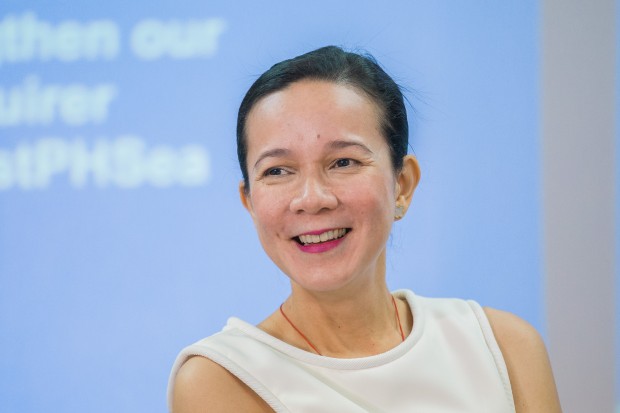Poe leads at starting gate
The race for Malacañang begins on Tuesday with Sen. Grace Poe at the head of the pack after regaining the lead in the latest Pulse Asia voter preference poll.
Vice President Jejomar Binay has dropped back to second place after a brief stint as leader at the height of voter uncertainty about Poe’s candidacy forced by legal challenges to her qualifications.
Poe is fighting in the Supreme Court to overturn the Commission on Elections (Comelec) decision to disqualify her from the presidential race on the grounds that she is not a native-born Filipino and that she does not meet the 10-year residency requirement for candidates.
READ: Poe regains lead; Binay, Roxas, Duterte in ‘statistical tie’—Pulse Asia
Binay is not alone in second place, as he is statistically tied with Liberal Party (LP) standard-bearer Mar Roxas and Partido Demokratiko Pilipino-Lakas ng Bayan (PDP-Laban) presidential candidate Rodrigo Duterte.
Article continues after this advertisementThe nationwide Pulse Asia survey taken from Jan. 24 to 28, the results of which were released on Saturday, showed Poe, was preferred by 30 percent of the 1,800 registered voters polled.
Article continues after this advertisementCompared with the December results, Poe’s latest score is 9 points up from 26 percent, buoyed by double-digit increases in Metro Manila, the rest of Luzon, Visayas and among Class D.
Binay, the leader in the December polls, had a voter support of 23 percent, a 10-point drop from his December score of 33 percent.
READ: Binay maintains lead; Poe, Roxas, Duterte in statistical tie—survey
Roxas and Duterte, the combative mayor of Davao City, each scored 20 percent.
Sen. Miriam Defensor-Santiago raised the rear, with 4 percent.
The poll had a margin of error of plus or minus 2 percentage points.
Voice of the people
Poe described the results of the poll as “overwhelming and humbling.”
“It echoes the voice of the people who trust and believe in my capacity to be a leader no matter what hurdles are thrown my way,” Poe said.
Binay’s camp shrugged off the poll, saying the candidates’ ratings were expected to fluctuate throughout the campaign.
“The Vice President has always maintained that the most important survey is on Election Day,” Rico Quicho, Binay’s spokesperson for political matters, said in a statement.
Caloocan Rep. Edgar Erice, LP political affairs chief, said Poe’s big voter support would be “up for grabs” after the Supreme Court ruled on her disqualification cases.
Marikina Rep. Romero Quimbo, spokesperson for Roxas’ campaign, said the results of the poll showed the fickleness of voters.
“The bright spot for [Roxas] is the fact that more than any candidate, he is the only one whose numbers have increased, slowly but surely,” Quimbo said.
“Roxas has no sudden dips or surges, unlike his rivals whose numbers have either increased or decreased from one month to the other by double digits. It shows that their support base is very weak, no permanency, unlike [Roxas’],” he said.
Compared with the December results, the scores of Roxas (from 17 percent) and Duterte (from 23 percent) recorded slight movements, while Santiago’s was unchanged.
Message to candidates
“At this point, these numbers should be a message to the candidates that they should be able to distinguish themselves apart from the others,” said Edmund Tayao, political science professor at the University of Santo Tomas. “Voters can no longer be convinced by one-liners, or by simply looking good when in public.”
He said that with Roxas’ figures seemingly plateauing, in the end it may very well be a three-corner fight.
Given the margin of error, Tayao said Poe’s 7-point lead was not yet significant.
Across areas and classes
Poe’s ratings improved across regions, posting double-digit increases in Metro Manila (33 percent from 21 percent), the Visayas (26 percent from 15 percent) and the rest of Luzon (39 percent from 29 percent). In Mindanao, her rating rose to 16 percent (from 11 percent).
Across socioeconomic groups, Poe’s ratings also improved among Classes D (32 percent from 22 percent), E (26 percent from 19 percent) and ABC (25 percent from 19 percent).
Preference for Binay plunged by double digits in Mindanao (14 percent from 30 percent) and the Visayas (20 percent from 34 percent), and declined slightly in the rest of Luzon (28 percent from 34 percent). It was virtually unmoved in Metro Manila (32 percent from 30 percent).
Binay’s scores dropped among Classes D (22 percent from 30 percent) and E (30 percent from 42 percent), and remained the same among Classes ABC (21 percent from 20 percent).
The rating of Roxas in the Visayas rose to 32 percent (from 27 percent), while in Mindanao it increased to 21 percent (from 13 percent). It was unchanged in Metro Manila (11 percent) and the rest of Luzon (16 percent).
Across classes, preference for Roxas increased 10 ticks among Class E (25 percent from 15 percent), and was virtually unmoved among Classes ABC (20 percent from 22 percent), and D (19 percent from 17 percent).
Preference for Duterte declined
11 points in Metro Manila (16 percent from 27 percent). It was 8 percent (from 13 percent) in Luzon outside Metro Manila, and 15 percent in the Visayas (from 18 percent). It was 48 percent in Mindanao (from 43 percent).
Duterte’s ratings across classes were 15 percent among Class E (from 20 percent), 24 percent among Class ABC (from 28 percent) and 21 percent among Class D (from 23 percent).
Santiago’s ratings were unchanged in Metro Manila (6 percent from 10 percent), the rest of Luzon (4 percent from
5 percent), Visayas (4 percent) and Mindanao (1 percent).
Likewise, Santiago’s score was down among ABC (7 percent from 9 percent), D (4 percent from 5 percent) and E (1 percent from 2 percent). With reports from Tarra Quismundo, Leila B. Salaverria and Gil abacungan
RELATED STORIES
Poe, Binay tied for lead in SWS poll
Poe: Gov’t, people abusing human rights have no right to lead PH
